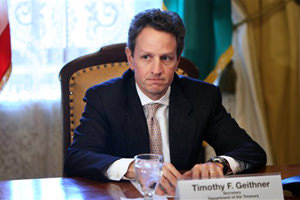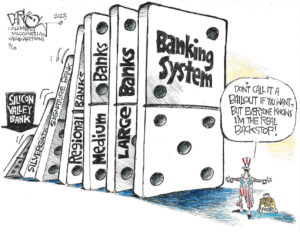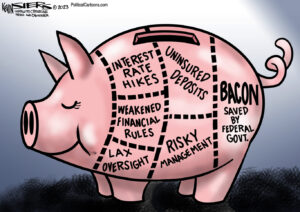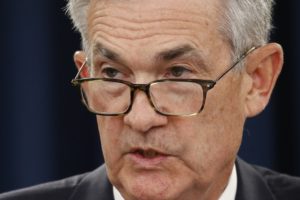Mr. Inside
The treasury secretary will get much better at making his case. I'm confident in that prediction because after watching his debut this week, I don't see how he could get much worse.
Treasury Secretary Timothy Geithner will get much better at making his case to Congress and the American people. I’m confident in that prediction because after watching his debut this week, I don’t see how he could get much worse.
Reviews of Geithner’s performance in rolling out the Obama administration’s financial rescue plan were so uniformly negative that to add my own would be piling on. Too much of the criticism, in any event, focused on style rather than substance. Geithner will inevitably become more comfortable speaking from a witness chair on Capitol Hill, which means he will begin to sound more confident and authoritative. The fact that he looks so young — kind of like “Doogie Howser, Cabinet secretary” — is something that he’s going to have to learn to use to his benefit, and that we’re just going to have to get used to.
What I hope he learned this week is how closely Americans are following the economic crisis and how angry they are. Geithner rose to prominence in the financial world at a time when it was assumed that brainiacs were running economic policy in Washington and major financial institutions on Wall Street. What did it matter that no one understood a word Alan Greenspan said? There was no need for regular folks to worry about the details.
To put it mildly: Wrong.
It will be a long, long time before it’s acceptable for a treasury secretary, Federal Reserve chairman, corporate CEO or anyone else who plays a powerful role in the economic life of the country to go up to Capitol Hill and say, essentially, “Trust us, we’ve got this.” But by presenting a plan that was all broad outlines and no fine print, that’s just what Geithner did.
The most important reaction wasn’t the stock market’s sudden swoon — nearly 400 points in the Dow — following Geithner’s appearance Tuesday before the Senate Banking Committee. Remember, his rationale for unveiling the new bailout plan before it was fully baked was to calm the markets. I suspect, though, that Wall Street wouldn’t have been happy unless Geithner had announced that his only new initiative would be to dump huge piles of money on street corners in lower Manhattan every morning. Unmarked bills, of course.
Geithner should pay more attention to the unrequited, Old Testament wrath that seems to be brewing over the financial crisis. I know it’s dangerous to generalize from anecdotal evidence, but I have to pay attention when, as happened earlier this week, an obviously intelligent, otherwise reasonable-sounding gentleman leaves me a voice mail message calling for “public executions” of Wall Street miscreants.
As president of the Federal Reserve Bank of New York, Geithner was a Wall Street insider. It’s probable that only an insider could understand the complexities of the financial crisis well enough to find a solution. But as treasury secretary, he’s now working on behalf of a nation of outsiders.
From an insider’s perspective, it’s easy to understand how imposing strict, loophole-free compensation limits at firms receiving bailout funds might give executives a disincentive to participate in the program. This is a position that Geithner reportedly argued within the administration. But when we outsiders learn, for example, that Merrill Lynch paid year-end bonuses of more than $1 million each to 696 employees, we are not inclined to lose sleep over measures that might cause Wall Street tycoons to shy away from the public trough.
The biggest tactical error that Geithner made was to address the Wall Street crisis before even formulating, much less articulating, the administration’s program for aiding Americans who are in trouble with their mortgages — again, seeming to have more empathy for the insiders than the outsiders. This is putting the cart before the horse — and the cart, destined for Wall Street, is laden with a staggering $1.5 trillion, while the horse, anxiously awaited by many thousands of desperate families, is still just a rumor.
Geithner has an incredibly tough job to do. The treasury secretary is always an important figure, but rarely such a public figure. The right tone for speaking about the economic crisis is elusive; even Obama, one of the most effective communicators we’ve seen in many years, seemed to find his voice on the subject only at the town hall meetings he conducted this week in Indiana and Florida.
Maybe Geithner should deliver his next economic update from a living room in a foreclosure-ridden neighborhood. Among the outsiders.
Eugene Robinson’s e-mail address is eugenerobinson(at)washpost.com.
© 2009, Washington Post Writers Group
Your support matters…Independent journalism is under threat and overshadowed by heavily funded mainstream media.
You can help level the playing field. Become a member.
Your tax-deductible contribution keeps us digging beneath the headlines to give you thought-provoking, investigative reporting and analysis that unearths what's really happening- without compromise.
Give today to support our courageous, independent journalists.




You need to be a supporter to comment.
There are currently no responses to this article.
Be the first to respond.